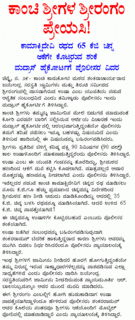One of the conceits Mr.Bhat and many of his colleagues including Ravi Belagere, Nagatihalli Chandrashekhar etc. engage in is to compare Indians and Americans. Of course they will make sure that Indians always come ahead. If not, at least Americans are portrayed in bad light.
When New York and parts of US & Canada experienced a blackout in August of 2003, Mr.Bhat did not let it pass by without praising the glory of Indians. He had to write a column. And, he did. Of course the column had to have factual errors, gross exaggerations and illogical conclusions.
Mr.Bhat
begins :
"monne hadinaidu tAsu ghOra kaggattaleyalli kuLitiddAga, barI vidyutcchaktiyannE tiMdu naDeyuva aDuge mane stabdhavAdAga anEka bhAratIyaru amerikannarannu kare karedu pukkaTe UTa hAkidaru. amerikannarige acchari!"
("The other day when everyone was sitting in total darkness, when the kitchens that run only on electricity had become silent, Indians [in US] repeatedly invited Americans and provided free meals to them. Americans were surprised!")
He further writes that on that day hotels in Florida, New York, New Jersey and California became soup-kitchens ("dAsOha kEndra") inviting guests and providing them free meal. According to him this strange generosity ("vichitra oudArya") of Indians was reported big time in many newspapers along with the news of blackout itself. He also writes when the whole nation was experiencing blackout ("iDI dEsh vidyut illade"), it is not unnatural for Americans -- who think "there is no free meal" -- to be mystified by this strange action of Indians.
When blackout struck we (the entire staff of 108 Sullu H.Q.) were in New York. The electricity outage was not selective about households. It was not just American kitchens that became silent that day; the kitchens of Indians became silent too. So how did Indians cook without electricity? Or do Indians not use electricity in their kitchens? In my experience and opinion the daily meal that a typical Indian family eats requires more preparation in kitchen than a meal eaten by a typical non-Indian American family.
The blackout affected mostly New York, New Jersey, Connecticut, some parts of Ohio, Pennsylvania, Michigan and Canada. This fact has been widely
reported. When that's the case, why did Indian hotel owners thousands of miles away in Florida and California offer free meals to their guests?! Of course it's because in Mr.Bhat's mind the power outage affected the whole of US. ("iDI dEsha vidyut illade"). We surely can't expect a celebrity journalist like Mr.Bhat to be aware of even basic facts about what he is writing . Can we?
He writes about reports ("doDDadAgi anEka patrikegaLalli prakaTavAgittu") about Indians' generosity that got widely published in many newspapers. Needless to say, he does not cite even one single example of these widely publsihed reports. As far as we can tell there was one
report about an Indian restaurant owner that got reproduced in many Indian newspapers and web sites. Other than that we could not find any reports specifically highlighting the generosity of Indians.
That day in August was a warm day. There were long lines of people standing in sun waiting for transportation back home. People were sweating and thirsty. Some used this opportunity to price gouge on water bottles. But, we also experienced first hand a few generous folks who were handing out cups of chilled water for free. We also noticed some restaurant owners offering free icecreams, other food and yes, even wine. Take a look at
here,
here and
here. NY Daily News
reported about shopkeepers giving away water and food.
Mr.Bhat (deliberately ?) misreads the American saying "There is nothing called a free meal" to imply that Americans lack generosity ("oudArya") when it comes to serving food. In truth both the American government and the American people indeed provide "free meal" for the needy.
Many American churches have food pantries where they regularly distribute grocery to the needy. In addition many churches, religious and other organizations run soup kitchens every day to serve hot food to any one who wants. Schools, libraries and yes even corporate offices hold food-drives regularly to collect food for the needy. In addition to these American government itself has a food-stamp program for the poor.
Of course Mr.Bhat either does not (care to) know any of these or he deliberately bends the facts to fit his narrative that Indians are more generous than Americans.
Why care about facts when readers trust you?!We at 108 Sullu H.Q. have no idea whether Indians are less or more generous than people of other nations. But, based on Vijaya Karnataka's rising circulation figures, it appears Kannada newspaper readers are very generous towards executive editors who strive to serve a low-fact news diet.

 We have many other examples. But the entire staff of 108 Sullu HQ is disinterested in peddling this sleaze any further. Even for the sake of analysis and commentary.
We have many other examples. But the entire staff of 108 Sullu HQ is disinterested in peddling this sleaze any further. Even for the sake of analysis and commentary.

 We have many other examples. But the entire staff of 108 Sullu HQ is disinterested in peddling this sleaze any further. Even for the sake of analysis and commentary.
We have many other examples. But the entire staff of 108 Sullu HQ is disinterested in peddling this sleaze any further. Even for the sake of analysis and commentary.
